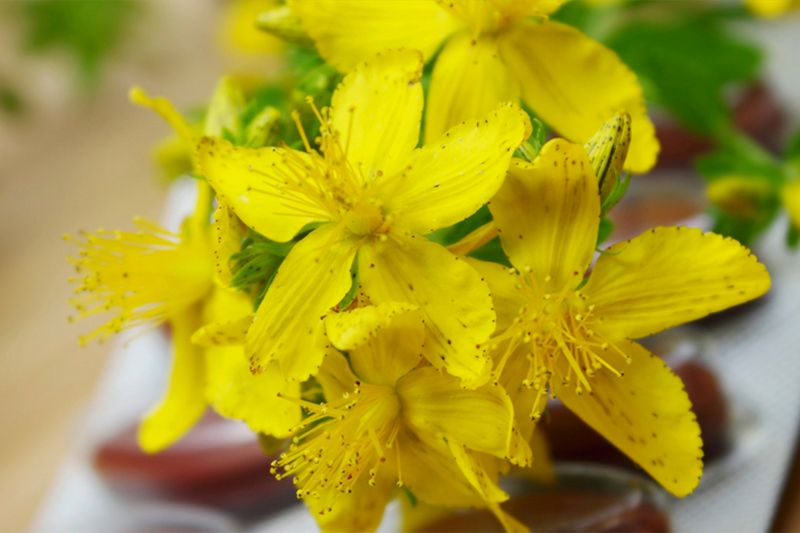
What are UTI’s? Urinary Tract Infections
Do you… Frequently or urgently need to urinate Often only pass small amounts of urine Have Pain or burning sensation when urinating These can be symptoms of urinary tract infections. There

St John’s wort, scientifically known as Hypericum perforatum, is a flowering plant in the Hypercaceae family which has been used medicinally to treat depression and a wide variety of ailments for thousands of years. Other common names for this herb include Johnswort, Amber, Touch-and-heal, Goat weed, Hardhay, Klamath weed, Rosin rose, Hypericum, and Tipton weed.
St John’s wort gets its name from its traditional flowering and harvesting on St John’s day on the 24th of June. The name of the genus Hypericum is derived from the Greek terminology hyper (above) and eikon (picture) in reference to the traditional hanging of plants over religious pictures in the home on St John’s day in a bid to ward off evil.
The plant has straight stalks and can grow up to 1m tall, with opposing, stalkless, narrow leaves approximately 1 – 2cm long. The leaves are green-yellow in colour and have scattered translucent dots which are highly conspicuous when held up to light. The flowers are yellow in colour, with 5 petals covered with black dots. It thrives in areas with either a winter or summer dominant rainfall pattern and will usually flower between late spring and early summer. While this herb is grown commercially in certain regions of south east Europe, it is considered a noxious weed in more than 20 countries and has introduced populations in South and North America, Australia, New Zealand, India, and South Africa. This plant acts as both a toxic and invasive weed by replacing native plant communities and forage vegetation, and causing illness to live stock upon ingestion.
Traditionally used as a tea. St John’s wort is also made into an oil for use in lotions and tinctures. It may also be taken internally as a capsule or tablet which are easily found in health food stores, pharmacies, and supermarkets.
St John’s Wort in this form contains flavonoids, phenolic acids, glycosides, rutin, tannins, resins, and essential oils.
Used topically, St John’s Wort can be used as a salve to treat wounds and bruises, used as a diluted oil to treat burns, used as an astringent to treat oily skin, or as a massage aid or compress to treat muscle pain.
It can also be used via direct inhalation, and can also be found in chopped or powdered form.
The oil should not be taken internally.
The suggested dosage for St John’s Wort is 900mg per day for treatment of non-melancholic depression, while 1800mg doses are recommended for the treatment of moderate to severe depression. The usual 900mg treatment can be split into thirds with 300mg taken 3 times a day. As with other antidepressant medications, this herb may take up to four weeks to exert any noticeable effect.
While generally well tolerated, St John’s wort can cause gastrointestinal discomfort such as abdominal pain, nausea, vomiting, diarrhoea, and loss of appetite, as well as headaches, dizziness, fatigue, confusion, aggression, anxiety, dry mouth, sexual dysfunction, skin reaction and restlessness.
This herb/supplement should not be used with the contraceptive pill as it decreases the levels of oestrogens such as oestradiol by accelerating its metabolism. The use of St John’s wort when taking the contraceptive pill can lead to decreased efficacy of the contraceptive and possibly unplanned pregnancy.
St John’s wort can also cause photosensitivity, resulting in visual sensitivity to light and to sunburn. The burns caused by this sensitivity, particularly in those with fair skin can be severe and cause blistering of the skin and possible scarring. The severity will depend on the amount of the plant consumed, and the length of exposure to sunlight.
Combining both St John’s wort and antidepressant medications could lead to an increase in serotonin levels, causing serotonin syndrome. Symptoms of this syndrome include agitation, confusion, shivering, high body temperature, tremor, sweating, increased reflexes, dilated pupils, diarrhoea, seizures, and extensive muscle breakdown. St John’s Wort should also not be used in conjunction with another mood boosting supplement 5-HTP as this mixture can also cause serotonin syndrome. Some “mood enhancing” supplements contain both of these ingredients so it is important to watch out for this.
Other popular herbs which can cause a negative interaction when combined with St John’s Wort include ashwagandha, capsicum, German chamomile, goldenseal, gotu kola, hops, kava kava, lemon balm, sage, skullcap, Siberian ginseng, stinging nettle, valerian, and yerba mansa.
The use of this medication is not recommended for those with bipolar disorder as there are concerns that St John’s wort increases the risk of mania in people with depressive bipolar.
This medication should not be combined with a MAO inhibiter antidepressant as this combination can produce a dangerous rise in blood pressure or hypertensive crisis, as well as severe anxiety, fever, muscle tension, and confusion.
St John’s wort should not be taken alongside certain foods that contain tyramine such as wine, beer, preserved meats, cheese, chocolate, sauerkraut, fermented soy products, and yeast extracts due to a MAO inhibition effect. The interaction between tyramine and these foods can be especially dangerous in people with high blood pressure.
This herb can interfere with medications used during organ transplant including antirejection medications.
St John’s wort can cause multiple drug interactions, including those of many prescription medications, cyclosporine, digoxin, reserpine, statin drugs, antihistamines, immunosuppressants, certain calcium channel blockers, migraine medications anti-seizure medications, anticoagulants, heart medications, HIV medications, cancer medications, warfarin, and any medication broken down by the liver, due to the induction of the cytochrome P450 enzymes CYP3A4 and CYP1A2. This results in the increased metabolism of certain drugs.
Do not use this herb if you are pregnant or breastfeeding. It is not recommended to give this herb to infants or children. Always consult with a doctor before taking any new supplementation.
However, in contrast to synthetic antidepressants, there have been no reports of Hypericum related deaths.

Do you… Frequently or urgently need to urinate Often only pass small amounts of urine Have Pain or burning sensation when urinating These can be symptoms of urinary tract infections. There
Disclaimer – Our intent is not to diagnosis but to offer information on therapy choices and practitioners. Information on this site is intended general educational purposes only. Any statements made are carefully referenced and any information, products or services discussed are not intended to diagnose, cure, treat or prevent any disease or illness. Please consult a healthcare practitioner before making a choice.